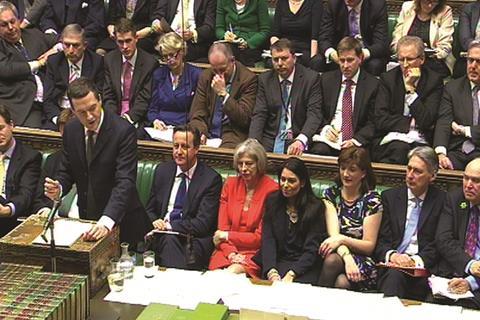Help to Buy ISA welcomed but Osborne offers little to solve housing supply problem or support construction

The announcement of a £2.2bn boost for homebuyers enlivened a pre-election Budget otherwise relatively empty of concrete measures to help the construction and infrastructure sector.
Chancellor George Osborne used his final budget before the May general election to portray himself as the architect of the UK’s recovery since the financial collapse prior to the 2010 election, but unveiled few truly new policies for the sector.
The most notable exception was the planned autumn introduction – dependent upon the election of a Conservative government in May – of a new Help to Buy ISA designed to aid people saving for a deposit to buy a house. Osborne said the government would give home purchasers a £50 contribution for every £200 saved, up to a maximum government contribution of £3,000 toward a home deposit.
The unexpected announcement, which came in the last minutes of the Budget statement, was in addition to a number of smaller measures to boost housebuilding, including:
■ The naming of 20 housing zones, including in Bristol, Poole, Derby, Gloucester and Stoke-on-Trent
■ £7m for a growth zone in Croydon, south London
■ Confirmation that three-quarters of homes at the Northstowe development in Cambridgeshire will be built directly by the government
■ £1m of funding for the London Land Commission, to create a database of public sector land and to map brownfield land.
Osborne’s deposit savings scheme, which would work through a dedicated ISA, would not be limited to new-build homes.
According to documents released with the Budget, it is estimated the policy could cost the government £2.2bn over the next parliament, with that money directly boosting the housing market. One senior housebuilding source described the move as “absolutely brilliant”.
A spokesperson for the Home Builders’ Federation said the proposal had “considerable merit”. “Anything that encourages people to save and helps people getting the deposit they need is positive. We all know the huge problems people have in saving the deposits required,” he said.
However, Kersten Muller, head of real estate tax at Grant Thornton UK, said that as the measure focuses on increasing demand rather than supply, it may do nothing to solve the housing crisis. “Our concern is that the boost provided though the tax system could result in higher demand and ultimately lead to higher house prices.”
National Housing Federation chief executive David Orr said the funding could have been better used to build 70,000 affordable homes.
The Federation of Master Builders welcomed other news, buried in the Budget documents, of the introduction of a proposed apprenticeship voucher, which it said would mitigate some potential problems posed by the previously announced introduction of a new system of apprenticeship funding.
In general, however, the sector said the Budget lacked measures fully to address the scale of the UK’s housing and infrastructure challenge. The RIBA described it as “uninspiring” and “piecemeal” and the UK Green Building Council said it was “barren” of measures to promote energy efficiency.



























No comments yet